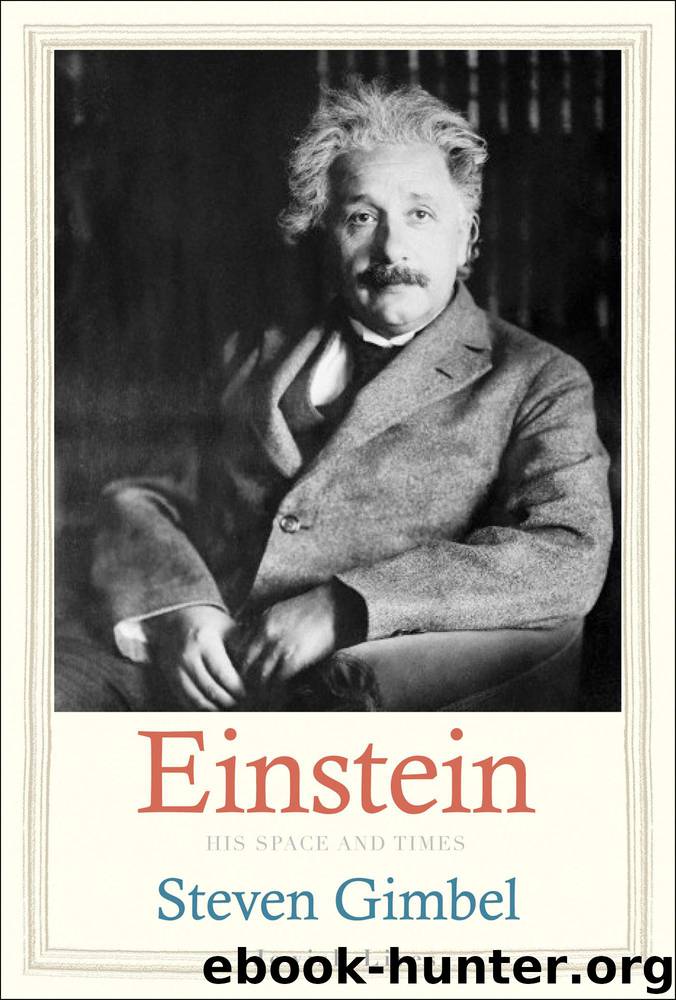Einstein by Steven Gimbel

Author:Steven Gimbel
Language: eng
Format: mobi
Publisher: Yale University Press
Published: 2015-07-12T07:00:00+00:00
5
The Worldwide Jewish Celebrity
ALBERT EINSTEIN RENOUNCED his German citizenship as a teenager at the same time that he renounced his Judaism. In his mind, both nationalism and religiosity were symptoms of a shackled mind requiring unthinking loyalty to a structure built on authority. As the unpleasantness surrounding his Nobel Prize illustrated, he had resolved himself with respect to citizenship. He openly declared himself to be Swiss despite the fact that he had turned down a significant offer that would have brought him back to Zurich, choosing to remain in Berlin.
While his status as a Swiss citizen was initially acquired for pragmatic reasons, that being to secure a job, the case was different with religious affiliation. When filling out the paperwork for his position in Prague, Einstein had to specify a religion. The law would not allow him to leave it empty or declare himself an unbeliever, and eventually he put down “Mosaic.”1 Similarly, on his divorce forms, he wanted to write “dissenter” as his religion, but the clerk again filled in “Mosaic.”2 At a time when Einstein openly declared himself to be Swiss despite not living in Switzerland, he still did not consider himself Jewish.
The pride in his Swiss citizenship came in part from his desire to remain alienated from Germany because of cultural elements that disturbed him as a child. Those aspects of German society flared up between the World Wars in a way that also made him view his Jewishness in a new light. Being Swiss, for Einstein, was not about whether he lived in Switzerland; rather it meant having a certain stance toward the world, an approach he had seen in his Swiss “papa” Jost Winteler. To be a citizen did not mean to embrace nationalistic sentiment toward your home nation. You could love your country and still be a free thinker. The fall of the Weimar government and the rise of National Socialism would create the same sort of dichotomy for Einstein with respect to religion. Einstein could become Jewish again in his own mind without having to surrender the scientific worldview, the personal ethic, or the metaphysical foundations upon which he rested his physical theories. Being Jewish became, for Einstein, similar to being Swiss. It was not a religious proclamation but something else, something more subtle, an inalienable aspect of his being.
World War I was to be a watershed event according to the mythology German nationalists were creating. Compared with the other nations of western Europe, the united Germany was a young country and, in a sense, coming late to the table of geopolitical supremacy. The others had all had glory days as reigning regional or fully global powers. The French, the British, the Dutch, the Spanish, the Portuguese—each had been colonizers and at various times held military sway over their neighbors. But through the nineteenth century and into the twentieth, Germany was finding its legs. Its industrial, scientific, cultural, military, and technological contributions displayed Germany’s status as an international leader. Intellectual systems, from Hegel’s
Download
This site does not store any files on its server. We only index and link to content provided by other sites. Please contact the content providers to delete copyright contents if any and email us, we'll remove relevant links or contents immediately.
Enlightenment Now: The Case for Reason, Science, Humanism, and Progress by Steven Pinker(7303)
A Journey Through Charms and Defence Against the Dark Arts (Harry Potter: A Journey Through…) by Pottermore Publishing(4796)
The Immortal Life of Henrietta Lacks by Rebecca Skloot(4571)
A Journey Through Divination and Astronomy by Publishing Pottermore(4375)
Elon Musk by Ashlee Vance(4118)
Origin Story: A Big History of Everything by David Christian(3679)
COSMOS by Carl Sagan(3617)
Alchemy and Alchemists by C. J. S. Thompson(3509)
Bad Pharma by Ben Goldacre(3419)
Enlightenment Now by Steven Pinker(3363)
Shadow of Night by Deborah Harkness(3352)
Inferior by Angela Saini(3310)
A Mind For Numbers: How to Excel at Math and Science (Even If You Flunked Algebra) by Barbara Oakley(3293)
Origin Story by David Christian(3191)
The Code Book by Simon Singh(3172)
Signature in the Cell: DNA and the Evidence for Intelligent Design by Stephen C. Meyer(3123)
The Elements by Theodore Gray(3050)
A Brief History of Time by Stephen Hawking(3017)
A Journey Through Potions and Herbology (A Journey Through…) by Pottermore Publishing(2843)
